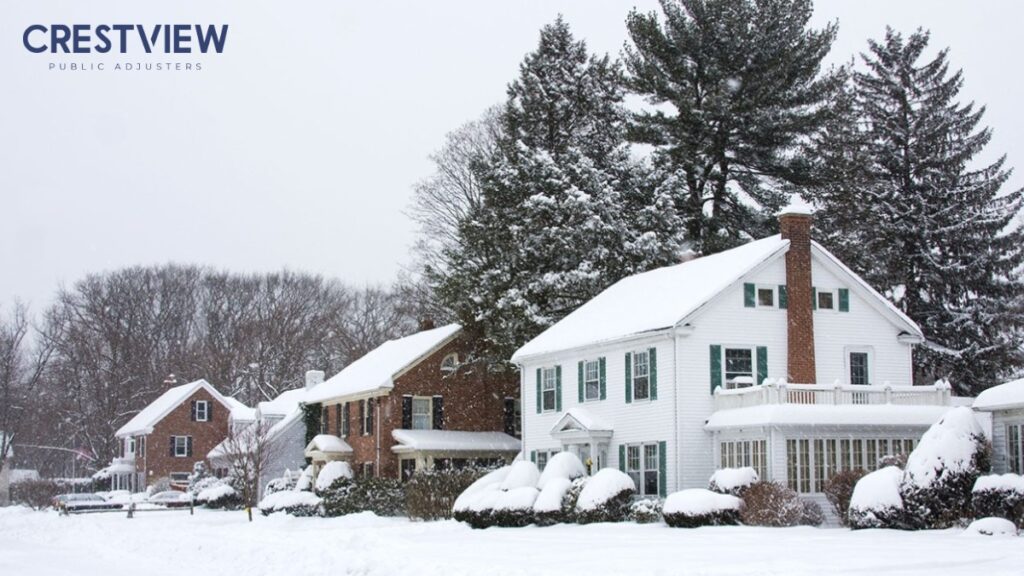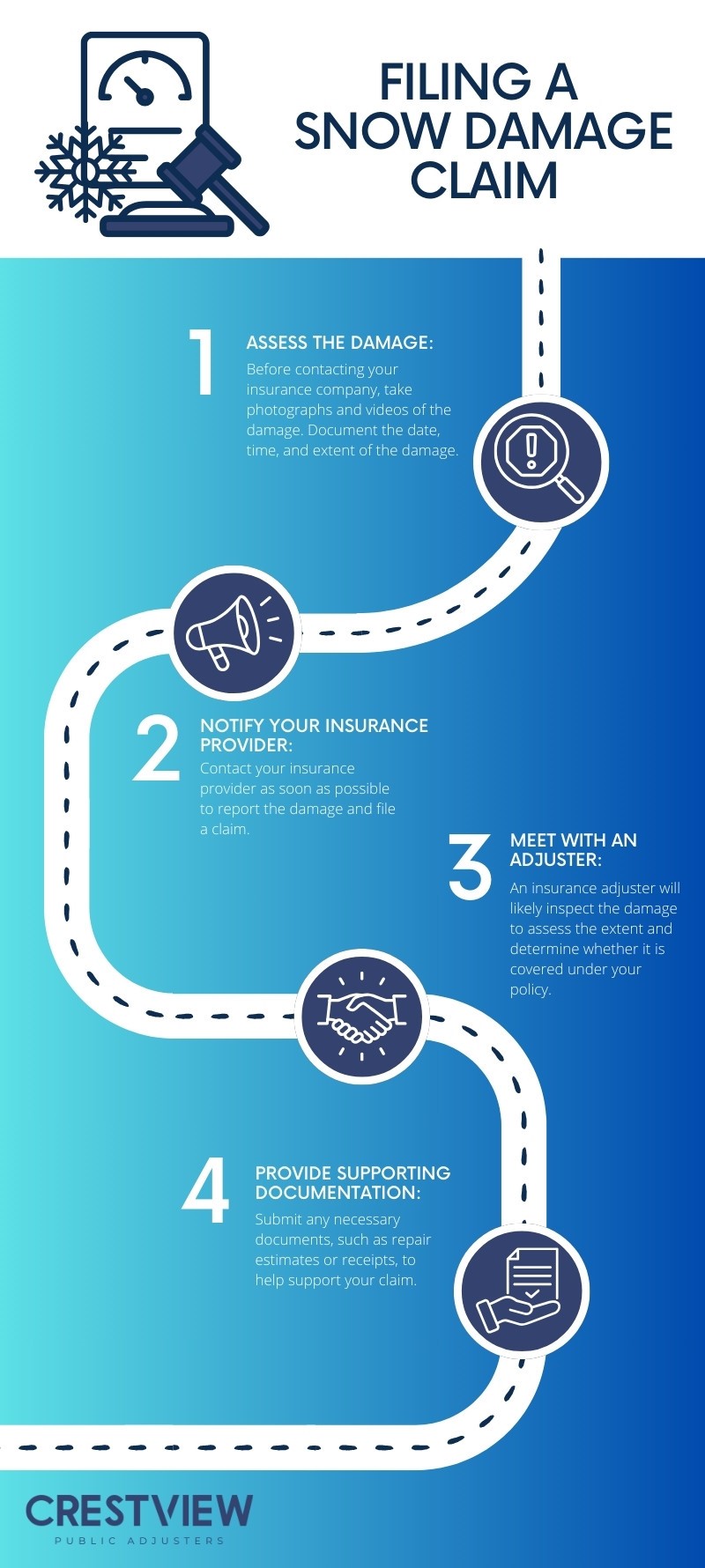Key Points:
- Snow damage may be covered by your homeowners insurance, but certain conditions apply.
- Understanding the scope of snow damage coverage can help you avoid costly repairs.
- Public adjusters like Crestview can help you assess your claim for winter-related damages in New York, New Jersey, and Florida.
Winter weather can wreak havoc on homes, and snow damage is a common problem for homeowners in colder regions. In fact, over 50% of American homes experience some form of weather-related damage every year. With heavy snowfalls, the potential for significant structural damage increases, whether from a collapsed roof or water damage from melting snow. One of the most frequent questions that homeowners ask is: Is snow damage covered by insurance?
Regarding winter storms, the answer isn’t always straightforward. Many factors determine whether your insurance will cover snow damage, including the specific terms of your policy and the type of damage incurred. To avoid surprises, it’s essential to understand the nuances of your insurance coverage. In this article, we’ll break down what snow damage is covered by insurance and what isn’t, helping you navigate the claims process more effectively.
What is Snow Damage and How Does It Affect Homes?
Snow damage is more than just the weight of snow accumulating on roofs or structures. It includes the following scenarios:
- Collapsed Roofs: Heavy snow accumulation can cause a roof to buckle under the weight, leading to structural damage and potential leaks. This is one of the most common and expensive forms of snow damage.
- Water Damage: When snow begins to melt, it can seep into your home, causing water damage. The melting snow often accumulates in areas where water cannot escape, such as the attic, ceilings, or walls.
- Frozen Pipes: When snow and freezing temperatures combine, pipes can freeze and burst, resulting in significant water damage to your property.
- Damage to Landscaping and Outdoor Structures: Snow accumulation can cause damage to trees, fences, or other outdoor structures.
Understanding these types of damage is key when filing a claim. Different insurance policies cover different kinds of damage, so knowing how your policy defines snow damage is critical to securing the compensation you need.
Is Snow Damage Covered by Insurance?
Yes, snow damage is covered by insurance in many cases, but there are several factors that can influence whether your policy will pay for repairs. Homeowners insurance generally covers damage caused by sudden, accidental events, including snow and ice accumulation, but the specifics depend on the type of coverage you have. For example, your insurance might cover the damage caused by snow buildup, but it may exclude damages due to poor maintenance, neglect, or wear and tear.
Types of Coverage for Snow Damage:
- Dwelling Coverage: This part of your homeowners insurance policy covers damage to the structure of your home, including damage from heavy snow or ice. This includes roof collapses and leaks caused by snow buildup.
- Water Damage Coverage: If snow melting causes water to seep into your home, your water damage coverage may pay for repairs. However, many policies only cover water damage if it was caused by an accidental event.
- Personal Property Coverage: If snow or ice damages your belongings, such as electronics or furniture, your personal property coverage may help pay for repairs or replacements.
It’s important to read your policy carefully to understand what is and isn’t covered when it comes to snow damage. If you’re unsure, it’s a good idea to talk to your insurance provider for clarification.

Exclusions in Snow Damage Coverage
While homeowners insurance generally covers snow damage, there are notable exclusions that could prevent a claim from being paid. Some of the most common exclusions include:
- Negligence: If your property is poorly maintained and the snow damage results from neglect (e.g., failing to clear your roof or keep gutters clean), your claim may be denied.
- Gradual Damage: Insurance policies typically don’t cover damages that develop over time, such as ice dams or mold caused by prolonged snow accumulation.
- Flooding: If the snowmelt causes flooding, this might not be covered under a standard homeowners policy. Flood coverage requires a separate policy.
Before filing a claim, make sure to assess whether any exclusions apply to your situation.
How to Prevent Snow Damage
While snow damage can be unpredictable, there are several steps you can take to minimize the risk of costly repairs:
- Clear Snow from Roofs: Regularly remove snow buildup from your roof, especially after a heavy snowfall. A roof rake with a telescoping handle can help you safely clear the snow.
- Install Ice Dam Prevention Systems: Ice dams can form when melting snow refreezes at the edge of your roof. Install proper insulation and ventilation to reduce the chances of ice dams.
- Protect Pipes from Freezing: Insulate exposed pipes and faucets to prevent them from freezing during extreme cold temperatures.
- Maintain Gutters: Clean gutters regularly to ensure that snowmelt can flow freely, reducing the chance of water damage.
Taking these preventative measures can reduce the risk of snow-related damage and, in some cases, ensure that your insurance will cover any damage that does occur.
How to File a Snow Damage Claim
If you’ve experienced snow damage and need to file a claim, the process typically involves the following steps:

Make sure to follow these steps promptly to ensure a smooth claims process.
Protect Your Property from Snow Damage – Contact a Public Adjuster
If you have experienced snow damage, it’s important to work with a trusted professional to ensure that your claim is handled properly. Crestview, a public adjuster for winter damage claims in Florida, New York, and New Jersey, can help you navigate the complexities of your insurance policy and ensure that you receive the compensation you deserve.
Don’t let snow damage leave you with expensive repairs. Whether you’re dealing with a collapsed roof, water damage, or frozen pipes, Crestview can help you file your claim and advocate for your rights. Contact Crestview today for expert assistance with winter damage claims.

